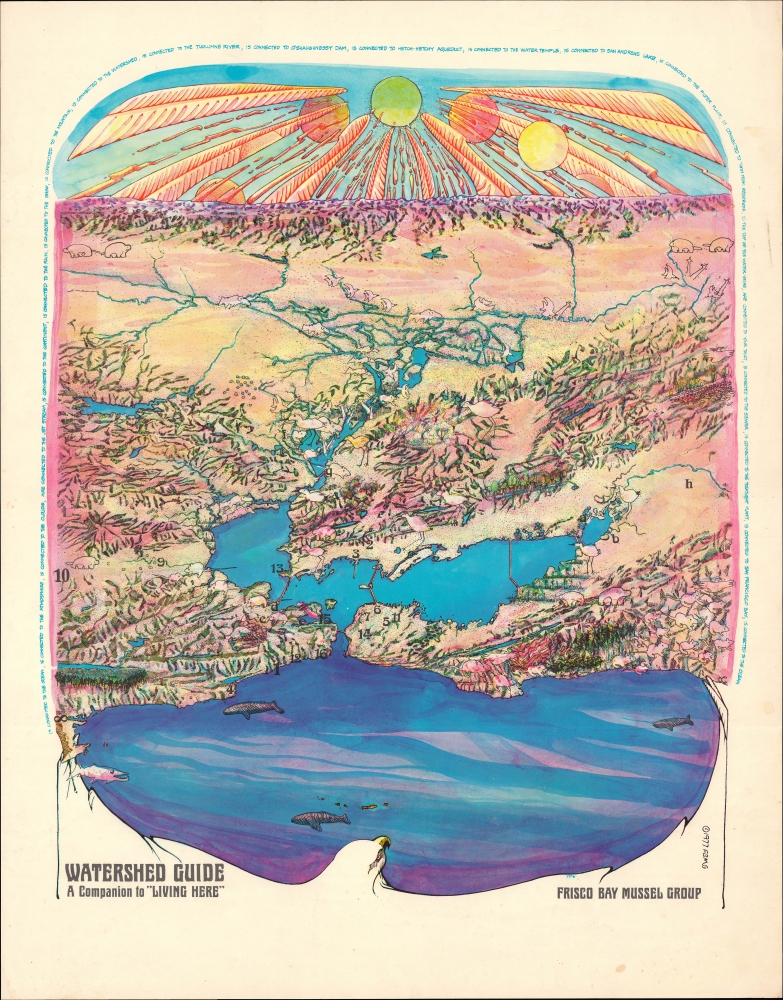1977 Frisco Bay Mussel Group Pictorial View of San Francisco Bay Watershed
SFBayWatershed-fbmg-1977$850.00

Title
Watershed Guide A Companion to 'Living Here'.
1977 (dated) 20.5 x 17 in (52.07 x 43.18 cm)
1977 (dated) 20.5 x 17 in (52.07 x 43.18 cm)
Description
A colorful view of the bioregion of San Francisco Bay, prepared in 1977 by the environmental activist organization Frisco Bay Mussel Group as a supplement to their publication Living Here.
The Frisco Bay Mussel Group was named after mussels, a keystone species in the Bay's ecosystem, symbolizing their commitment to protecting local habitats. The group's activities included advocating for the restoration of wetlands, opposing destructive water projects like the proposed Sacramento River Peripheral Canal, and promoting sustainable urban practices such as graywater recycling and urban gardening. They were also involved in efforts to resist tax policies that funded environmentally harmful projects and sought to develop local food distribution systems. As pioneers of the environmental movement in California, many of their ideas have since been integrated into local policies and practices.
A Closer Look
Oriented towards the east, this view looks over San Francisco Bay towards the Sierra Nevada and the waterways emanating from them, collectively forming the San Francisco Bay Watershed. The Sacramento-San Joaquin River Delta is especially prominent at the center. Wildlife - including birds, rodents, and marine life - and the landscape are emphasized, with no evidence of human habitation aside from the bridges around the Bay. Letters and numbers on the view correspond to the publication from which it was appended: Living Here. The text surrounding the view emphasizes the interconnection of different parts of the environment, especially the water system:…is connected to the ocean, is connected to the atmosphere, is connected to the clouds, are connected to the jetstream, is connected to the continent, is connected to the rain, is connected to the snow, is connected to the mountain, is connected to the watershed, is connected to the Tuolumne River, is connected to O'Shaughnessy Dam, is connected to Hetch-Hetchy Aqueduct, is connected to the water temple, is connected to San Andreas Lake, is connected to the filter plant, is connected to Twin Peaks Reservoir, is the top of the water veins, are connected to your toilet, is connected to the sewer, is connected to the treatment plant, is connected to San Francisco Bay, is connected to the Ocean….
The Frisco Bay Mussel Group
The Frisco Bay Mussel Group was a grassroots 'bioregional study group' that emerged in the 1970s in the San Francisco Bay Area, part of the broader environmental and social justice movements of the time, focusing on bioregionalism and the ecological health of the Bay Area. The group was closely related to the Planet Drum Foundation, founded by Peter Berg (1937 - 2011), an artist and environmentalist who had earlier been involved with the Diggers, an art and activist group at the center of the counterculture that emerged in the Haight-Ashbury neighborhood of San Francisco in the mid-1960s. Berg was a proponent of the concept of bioregionalism, in which the political, cultural, and economic system of a region should be defined around its landscape and climate.The Frisco Bay Mussel Group was named after mussels, a keystone species in the Bay's ecosystem, symbolizing their commitment to protecting local habitats. The group's activities included advocating for the restoration of wetlands, opposing destructive water projects like the proposed Sacramento River Peripheral Canal, and promoting sustainable urban practices such as graywater recycling and urban gardening. They were also involved in efforts to resist tax policies that funded environmentally harmful projects and sought to develop local food distribution systems. As pioneers of the environmental movement in California, many of their ideas have since been integrated into local policies and practices.
Publication History and Census
This view was included in the scarce one-volume publication Living Here, produced and published by the Frisco Bay Mussel Group in 1977. The view itself is noted among the holdings of the University of Nevada, Reno (part of the Planet Drum Foundation Collection) and the Oakland Museum of California (two examples). The entire Living Here volume is held by ten institutions in the OCLC.Source
Frisco Bay Mussel Group, Living Here, (San Francisco: Frisco Bay Mussel Group) 1977.
Condition
Very good.
References
Oakland Museum of California 2010.54.3614, 2010.54.7873. University of Nevada, Reno AC0486_2_11_4. OCLC 36014714 (entire volume).

